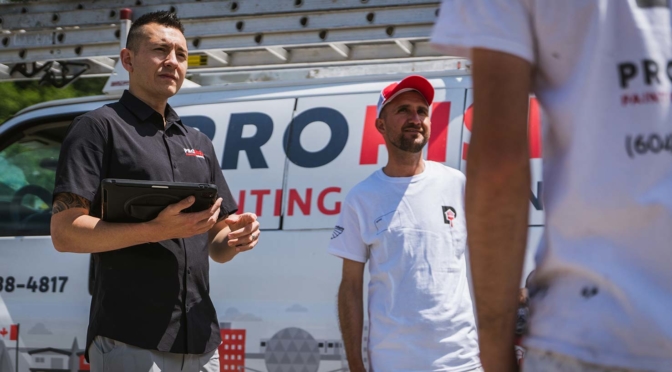This article by Benji Carlson is the fifth in a series from PPC and the Painting Contractors Association (PCA) designed to help you understand and prepare for the challenges of business growth.
What is project management and why is it important?
In its essence, project management is the process of leading the work of a team to achieve all the production goals within the given constraints: scope, budget, and time. It’s a learned skill with nuance and complexities, not something you would just “pick up on the job site.” I mean, you can get a master’s degree in this stuff! So don’t worry… if you’re behind in this area, I’m here to tell you so is everyone else.
Painting (like most other craftsman trades) is a fragmented space and is sometimes slow to pick up on technologies and methodologies that other industries have had for decades. If you get going on this now, you’ll still be way ahead of most of your competition.
Now, the specific details of project management for painting a home vs. project management for building software are obviously going to differ, but the fundamental underpinnings are the same. And it’s these “fundamental underpinnings” that, from our perspective, are missing for most painters.
If you Google “project management fundamentals,” you’ll see a bunch of esoteric language and explanations. While there is a lot of good stuff out there, most contractors we work with are looking for the highest ROI and lowest headache systems to implement.
If we trim the fat and look at what you absolutely need as a professional painter, it’s four main things:
1. A dialed-in project plan
Building a project plan starts with an accurate and thorough estimate in which no stone is left unturned, and the details are exact. They also include a material management plan, risk management plan, budget line items and a safety plan. The upfront work on these creates an efficiency multiplier through the life cycle of the project.
2. Budget management
When it comes to the numbers, good production managers need to be able to answer: How are each of my line items performing? What is my projected gross profit on this job? If forecasted gross profit isn’t where it needs to be, can they look at their budget and find places to make up ground? It’s also vital they’re able to articulate how change orders from the client will affect the overall cost in a diplomatic way, reducing surprises and those awful “but I thought this was included!?” conversations everyone hates.
3. Schedule and critical path
When most painters want to make more, they charge more. And that can work – pricing tactics that put you ahead are cool. But if you look at the companies that are exceedingly profitable (+20 percent net), the unique ability they have that others don’t is their ability to hammer through projects FAST. Their schedules follow a critical path with frequent milestones they can drive towards. These overhead efficiency gains are what trickle down to your bottom line.
4. Communication plan
Everyone professes to be a good communicator, but in contracting, it’s different. You need cleaner, more structured communication. The first thing a great PM does is lay out all the people who could theoretically come in and affect this job in a positive or negative way. Outline what meetings need to take place and with whom. The clients. Their neighbors. Trade partners.
Who else is in the mix here for this project? When do we need to be speaking with them? What should we be talking about? Pre-booked and agenda-driven meetings deliver a way higher quality communication with way fewer phone calls. When you free up time, the results always follow.
We hope this helped. Project management is hard, and painting is far more complex than most people realize (there’s a reason people loathe doing it themselves). Just remember, the majority of your competition is literally nowhere on this stuff. If you get going now, the accelerated gains will quickly put you into a new league of play.
This article was published in the Summer 2023 issue of PPC magazine. ©2023 Randall Reilly. Story by Benji Carlson. Carlson hosts The Contractor Evolution Show by Breakthrough Academy. Early in his career, he ran a high-growth painting company in Kelowna, British Columbia, and in his tenure with Breakthrough Academy, he has assessed more than 1,200 contracting companies to get them on track to scale. Learn more about implementing better project management infrastructure and growing your business at btacademy.com.

